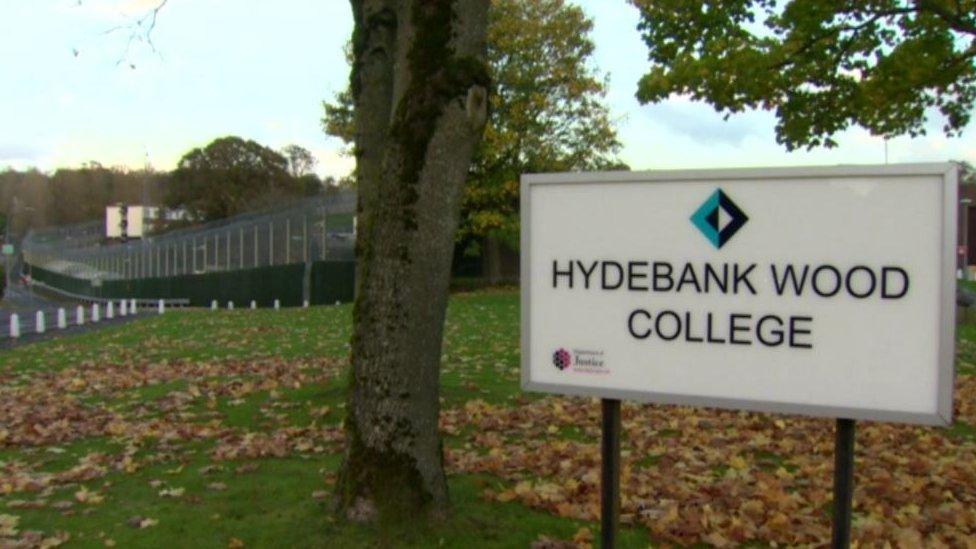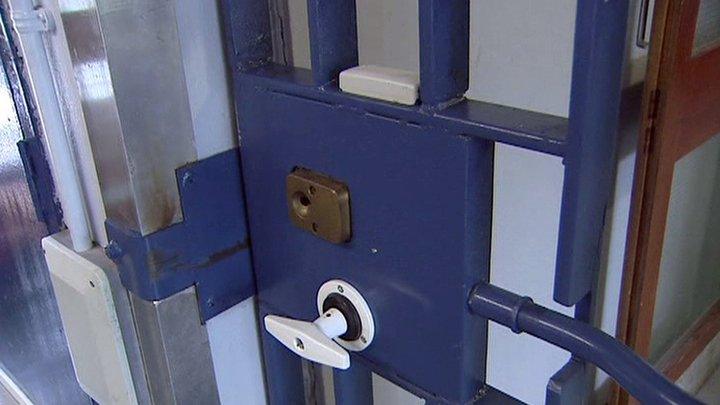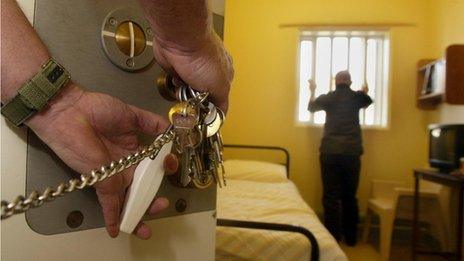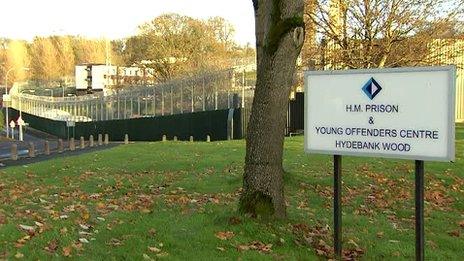Hydebank Wood: Concern over increase in female prisoners
- Published

As well as female prisoners, young male offenders are also held on the same site in Hydebank Wood's secure college
Concerns have been raised over an increase in the number of women being held in Northern Ireland's only female prison.
Ash House in Hydebank Wood Prison can hold up to 71 women.
This month the number of female prisoners reached 84, the highest recorded in the past five years.
The NI Prison Service said it was using other facilities on the Hydebank Wood site to manage the higher inmate numbers.
A spokesperson said: "It is not unusual for prison populations to fluctuate, which is why NIPS has plans in place to manage this throughout its estate.
"While Ash House has 71 rooms, it is not the only facility for female prisoners at Hydebank Wood. Therefore 'doubling up' is not always necessary but can be accommodated, if necessary, on a voluntary basis."
A spokesperson for the Department of Justice said it recognised the number of women in custody was a "significant issue" and it was committed to "reducing offending among women".
As well as female prisoners, young male offenders are also held on another part of the site in Hydebank Wood's secure college.
In 2017/18 the average daily population of female prisoners in Northern Ireland was 57.
But in recent weeks the number of female prisoners in Hydebank Wood has increased to over 80, peaking at 84 in mid-July. It has since fallen back to 81.
A series of previous criminal justice reports have called for a separate women's prison to be built.
The NI Prison Service say the development of a separate facility for female prisoners is "a priority".
'Inappropriate'
The Northern Ireland director of Amnesty International, Patrick Corrigan, said that it was "inappropriate" to continue to house female inmates at Hydebank Wood Prison.
He said: "The increase in Northern Ireland's female prison population, and consequent overcrowding in Hydebank Wood, exacerbates a range of existing human rights concerns about the facility.
"It has long been acknowledged that there is a need for a stand-alone, purpose built women's prison. In 2016, the Criminal Justice Inspectorate noted the inappropriateness of detaining women within a facility for young men."

The NI Prison Service say the development of a separate facility for female prisoners is a priority
He added: "A society can be judged on how it treats its prisoners. This issue requires long overdue and urgent political attention. In the absence of a devolved justice minister, the Secretary of State should focus on the detention conditions of women imprisoned here."
Vulnerable
During 2017/18 there was an increase in the number of female remand inmates in Hydebank, while theft offences accounted for the largest proportion (30%) of crimes for which women were sent to prison in Northern Ireland.
When a person is remanded in custody it means that they will be detained in prison until a later date when a trial or sentencing hearing will take place.
Criminology lecturer Gillian McNaull spent time in Hydebank Wood Prison as part of research for Queen's University.
She said: "Many women are not remanded due to the severity of their crime, but instead due to their vulnerability.
"I found that a significant number of women are being arrested and remanded to custody for issues relating to mental health crisis, suicidal ideation, alcohol use issues and homelessness."
She added: "This sees an unacceptable use of prison as a place of 'safety' and 'containment' for women - an issue exacerbated by deficits in community resources, such as a lack of gender-appropriate hostel accommodation, adequate community mental health support and social care provision."
A Department of Justice spokesperson said: "The Department is reviewing and revising its strategy for women in the justice system with a specific focus on prevention, diversion and support in the community.
"This will include the issues highlighted in relation to accommodation, mental health support, and social care provision."
- Published1 March 2013

- Published10 May 2013

- Published1 October 2013
